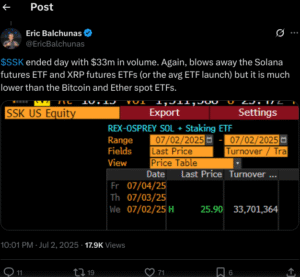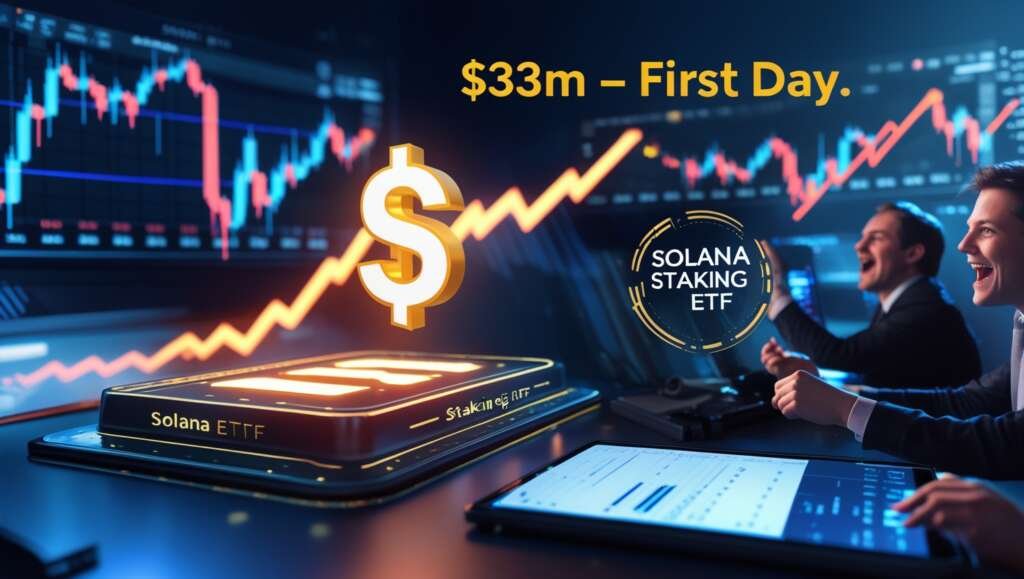The crypto world, yet again, celebrated another milestone, as the first-ever approved staking-enabled crypto ETF REX-Osprey Solana + Staking ETF (SSK), debuted on the Cboe BZX. It was a debut to remember as the ETF pulled in an impressive $33 million on its first trading day, with $12 million in net inflows.
According to Bloomberg Senior ETF Analyst Eric Balchunas on X, the REX-Osprey Solana + Staking ETF saw $33 million in first-day trading volume. The performance outpaced Solana and XRP futures ETFs and the average ETF debut, though it still fell short of spot BTC and ETH ETFs.

The launch is a clear indication of a new frontier in financial investment products that benefits both traditional investors and crypto enthusiasts seeking passive crypto income.
Solana Staking ETF Finally Makes Its Debut
After a long time waiting, Solana Staking ETF has finally been approved. $33 million in trading volume achieved on the first day, including $8 million in the first 20 minutes, shows strong early interest. The impressive numbers indicate a healthy start.
Although the numbers still fell short of the $4.6 billion trading volume recorded by Bitcoin and Ether Spot ETFs, Solana Staking ETF’s debut shows increased investor appetite and its untapped potential.
Interestingly, the remarkable debut didn’t reflect on SOL’s prices long-term. The crypto asset, after falling 8% before the launch, recovered post-launch to show investor confidence. However, long-term gains still seem invincible.
SSK Benefits Both Traders and Investors
The launch of a Solana Staking ETF benefits both traders and investors, as it provides direct exposure to the underlying asset, SOL. This is similar to traditional crypto ETFs like spot Bitcoin ETFs. Unlike traditional crypto ETFs, staking ETFs like SSK hold SOL and stake it on behalf of investors to generate yields. Currently, SSK generates earnings of up to 7.3% annually.
Staking ETFs also differs from traditional staking in that users don’t need to lock up tokens and manage validator nodes. SSK allows investors to enjoy yields without the complexity of staking. In addition, staking ETFs provides a compelling earning model that mitigates risks. Investors can earn yield from staking, even while SOL’s price swings during the market’s volatility.
Could More Staking ETFs Follow Solana?
Experts believe that more staking ETFs will follow suit after the successful debut of Solana Staking ETFs. Ethereum, for example, would want to build on Solana’s success for its staking ETFs. However, it would have to wait for the SEC to finalize its stance on whether staking is a non-security or otherwise.
Speaking of more launches, PoS chains, such as Cardano and Avalanche, could be next in line to announce their staking ETFs. They are natural candidates, given their staking mechanisms and similar architecture to Solana. However, everything depends on the SEC’s regulatory approval and the interpretation of the 1940 Act, which cleared the path for SSK.
With more staking ETFs on the horizon, asset managers and institutional investors will be poised to enter the staking space. The effect will be a rise in trading volumes, which could also positively affect SOL’s price. Furthermore, the rise in institutional investments may give rise to a unique class of staking ETFs – ones which will redefine staking.
Could Regulations Hinder the Launch of Future Staking ETFs?
The landscape of crypto investing is about to change profoundly with staking ETFs. However, regulatory delays remain a massive challenge for launching staking ETFs. Currently, ETF issuers must abide by the lengthy 19b-4 application filings before their traded funds can be approved.
Fortunately, the SEC is considering adopting a simpler crypto ETF process by substituting the 19b-4 application with the Form S-1. This will allow approval within 75 days if the SEC doesn’t object. This streamlined approach will potentially fuel the launch of various crypto ETFs.




